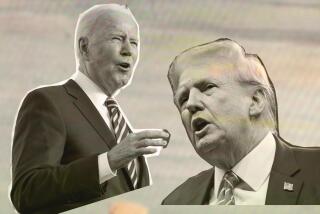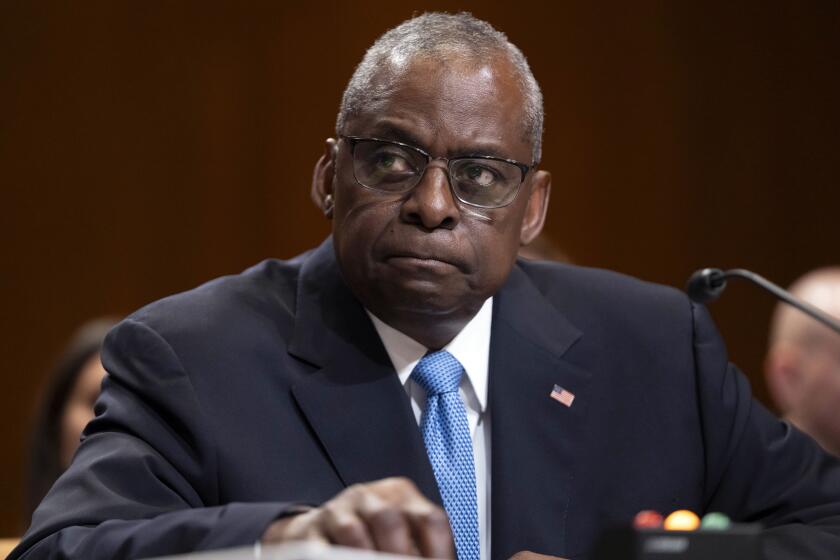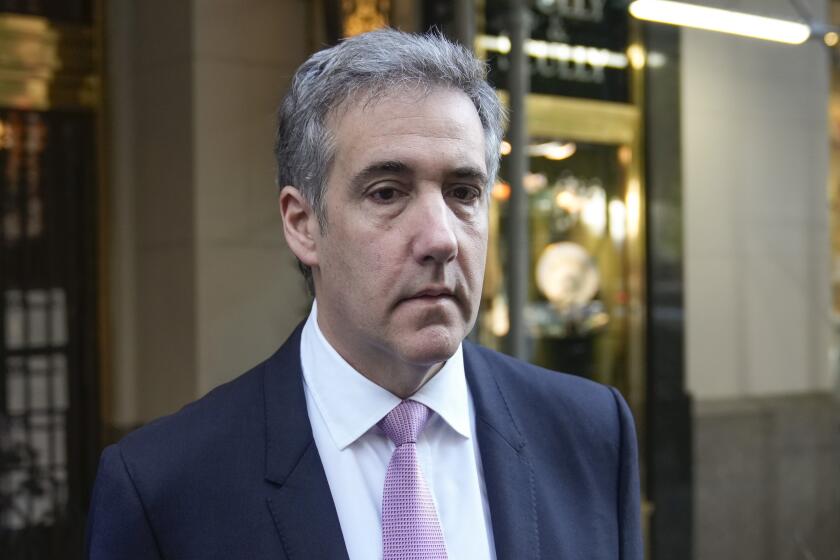Flukes, Fate Play Big Role in Fight for Senate Control
The plane crash that killed Sen. Paul Wellstone (D-Minn.) is just the latest in a series of bolts from the blue that have buffeted the national political parties in this year’s bitter fight for control of the Senate.
Some of the biggest mood swings in this year’s campaign have been driven not by the big issues of war, peace and the economy, but by flukes that have little to do with whether voters want Democrats or Republicans to control the Senate and thus serve as a brake or reinforcement to President Bush’s policy initiatives.
A Democratic senator from New Jersey drops out of the race at the last minute because of questionable gifts he accepted. A Republican candidate in Montana drops out, then jumps back into the race, because of a Democratic Party television ad he considered scurrilous. An Iowa Democrat gets in hot water because his campaign staff apparently leaked a tape of a meeting of his GOP opponent.
Every political campaign can be shaped by such unpredictable episodes. But this year every local accident, scandal and quirk of fate draws national attention because, with Democrats controlling the Senate by a mere 50-49 margin -- before Wellstone’s death -- the 2002 election has been one in which each Senate race could determine the outcome.
So when Wellstone’s plane crashed Friday in northern Minnesota, it was not just a tragedy for his family, his state and the liberal causes he represented. It also was a big political problem for national Democratic Party officials who have been on a roller coaster throughout this volatile election cycle.
“It has been an emotional time,” said Sen. Patty Murray (D-Wash.), whose tenure as chairwoman of the Democratic Senatorial Campaign Committee has spanned last year’s Sept. 11 terrorist attacks and the Capitol’s exposure to anthrax. “You can’t predict the future, and there are paths you never expect to go down.”
The Minnesota Democratic-Farmer-Labor Party has until Friday to announce who will replace Wellstone on the ballot. Party officials say no decision will be announced until after Wellstone’s funeral, which will not be before Monday.
But state and national party leaders have been putting pressure on former Vice President Walter F. Mondale to come back into politics, take Wellstone’s place on the ticket and, with the strength of his vast celebrity in the state, help the party keep that crucial Senate seat.
Among the Democratic Party stalwarts who have spoken to Mondale about the race have been Murray, Senate Majority Leader Tom Daschle (D-S.D.) and AFL-CIO President John J. Sweeney. Mondale has not commented publicly on his plans, but he has said nothing to discourage the speculation.
“He’s not said no, but he’s not said yes,” a top party strategist said.
Without Mondale, national party strategists say, Democrats will have a harder time holding the seat -- and could lose control of the Senate -- not because voters prefer the Republican agenda, but because of an aviation tragedy.
Federal officials arrived Saturday to investigate the crash site in Eveleth, Minn., and retrieve the remains of Wellstone, his wife and daughter and five others. The National Transportation Safety Board sent a team to the site, initially in search of a flight recorder that, it turned out, the plane did not carry.
Still in shock and mourning over Wellstone’s death, leaders of Minnesota’s DFL Party met Saturday to discuss how to proceed in the Senate race. But Wellstone’s family and close allies still were focused on efforts to properly memorialize him. State officials acknowledged after the meeting that there was growing consensus that Mondale would be the best choice as a replacement on the ballot.
“I wanted to make sure Democratic leaders were all on the same page,” DFL Chairman Mike Erlandson said after the meeting. “We need to remain unified.”
Some members of the Wellstone campaign want either to keep Wellstone’s name on the Nov. 5 ballot, which may not be legally possible, or have his two sons receive consideration.
State party officials said Wellstone’s sons would have a say in the matter of their father’s succession and were under consideration. Others, however, said the decision to go with Mondale was all but official.
Mondale, who turns 75 in January, served as senator from 1964 to 1976, has national clout and strong name identification. He has a law practice in Minneapolis and has maintained a public presence in the state.
David Wellstone, who has been active in state politics and served as political director for the gubernatorial campaign of Hubert H. Humphrey’s son Skip in 1998, is considered to more closely mirror his father’s liberal views and would permit the DFL to leave the Wellstone name on the ballot, where it could garner many sympathy votes.
Though many state and national political analysts predicted that the Wellstone tragedy would lead to a surge of support for Minnesota’s Democratic candidates and place Republican Senate candidate Norm Coleman at a disadvantage, Coleman could well reap benefits from the problems it will cause in the election process.
Thousands of absentee ballots were mailed out in Minnesota before Wellstone’s death, and many were beginning to trickle in. The effect could be significant: More than 380,000 absentee ballots were cast four years ago in Minnesota.
Officials will count votes for Coleman on those ballots, but not votes for Wellstone. Instead, voters who cast ballots for the incumbent senator prior to his death have the option of voting again at the polls on election day.
This is the second time in a month that Democrats have had to scramble to replace a Senate candidate late in a cliff-hanging campaign. Sen. Robert Torricelli (D-N.J.) last month abruptly dropped his reelection bid because of nagging ethical questions raised about gifts he had received from a supporter.
Democrats turned to former Sen. Frank Lautenberg (D-N.J.), another retired politician who, like Mondale, comes from the party’s liberal wing. As disruptive as that shift was, many Democrats believe they are now in a better position to hold on to the seat than when Torricelli was running for reelection.
A more quirky ballot shift came in Montana, when Democratic Sen. Max Baucus’ GOP opponent, state Sen. Mike Taylor, abruptly dropped out of the race to protest a campaign ad that he considered to include slanderous allegations about his former beauty salon business. A couple of weeks later, Taylor jumped back into the race, which still is expected to end in a slam-dunk win for Baucus.
Another race where a scandal abruptly shifted a campaign dynamic was in Iowa, when Democratic Sen. Tom Harkin’s campaign staff was implicated in leaking a tape recording of a campaign meeting of his GOP opponent, Rep. Greg Ganske. Harkin remains favored to win, but it gave Ganske an unexpected boost at a time when the Democrat was facing smooth sailing to reelection.
Hook reported from Washington, Bustillo from St. Paul, Minn.
More to Read
Get the L.A. Times Politics newsletter
Deeply reported insights into legislation, politics and policy from Sacramento, Washington and beyond. In your inbox three times per week.
You may occasionally receive promotional content from the Los Angeles Times.







